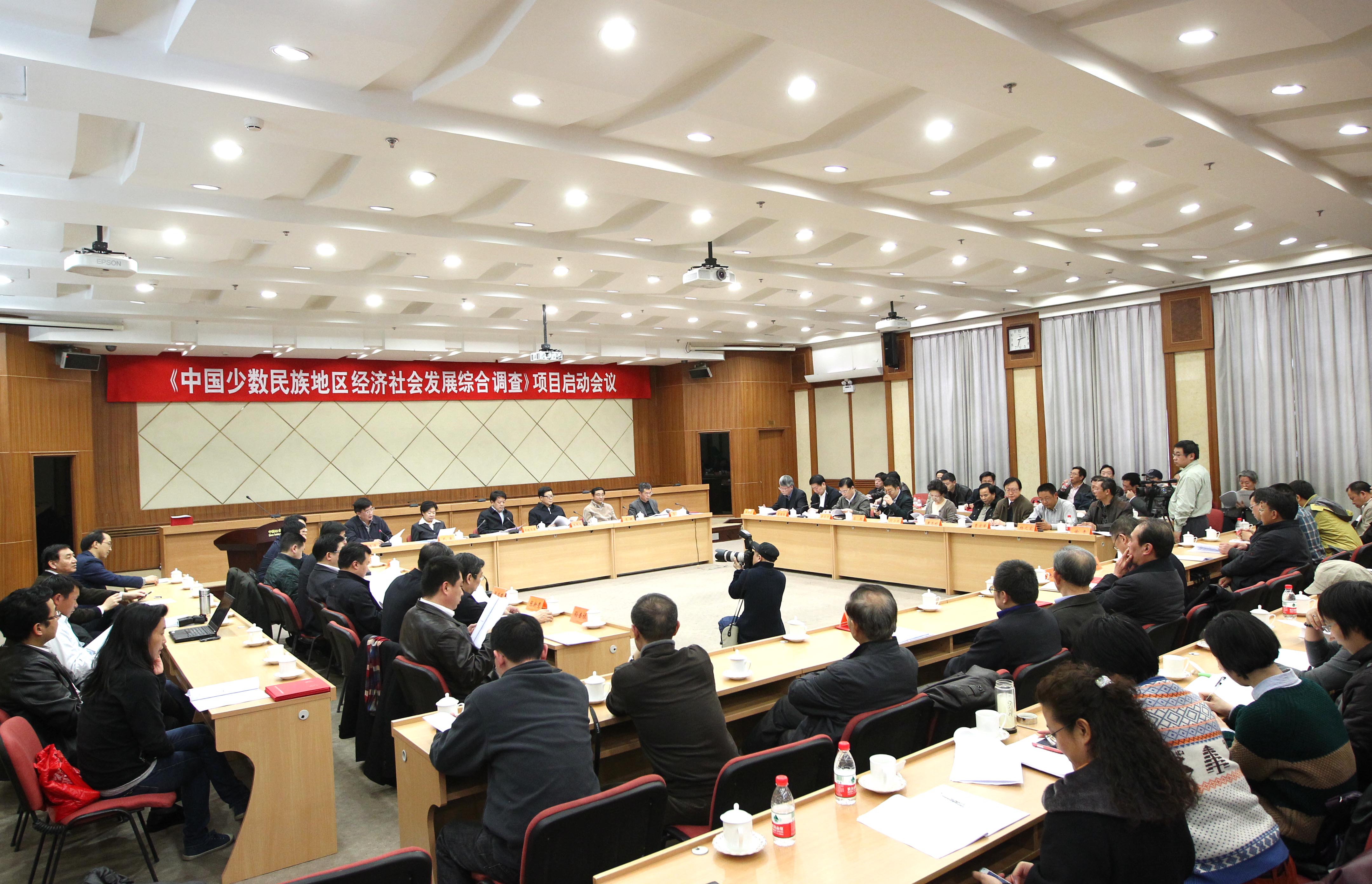Monumental survey kicks off in China’s minority regions

A launch conference of "Comprehensive Survey of Early 21st Century Economic and Social Development in Chinese Minority Regions" is held. (photographed by Zhu Gaolei)
On March 18th, a launch conference for the release of a broad and in-depth survey of socioeconomic conditions in China’s ethnic minority regions was held in Beijing. The survey, entitled “Comprehensive Survey of Early 21st Century Economic and Social Development in Chinese Minority Regions” received sponsorship from the National Social Science Fund as a special project, and from the Chinese Academy of Social Sciences as an Innovation Project. Wang Weiguang, deputy secretary of the Party group and executive vice president of CASS, Li Jie, Wu Yin and Li Yang, all of whom are members of the Party group and vice presidents of CASS, Huang Haotao, a member of the Party group and secretary -general of CASS, Tondrub Wangben, deputy minister of State Ethnic Affairs Commission, were among some of the notable attendees to the conference.
In a speech addressing the conference, Wang Weiguang indicated that the goal of project, and its guiding ethos, is to draw systematic conclusions from the experience and lessons learned in developing Chinese theories of ethnicity. These systematic conclusions are in turn to be channeled toward the full implementation of the Party’s policies toward ethnic issues and promotion of ethnic minority regions’ comprehensive, balanced and sustainable development. Those conducting the project will carefully review the Party’s theories and policies, in particular those since reform and opening up, which have found uniquely Chinese solutions. Wang advised that the project should summarize China’s achievements in addressing ethnic issues and in the social development of minority regions since 1949, especially after reform and opening up, and provide policy recommendations for solving the current issues in those regions.
At the conference, Wang and other leaders issued letters of appointment to the project board members, expert committee members and head of the research team for each of the 16 areas in the first phase of the project. The survey range of the first phase includes Xinjiang, Guizhou, Yunnan, Qinghai and Inner Mongolia.
Noting that the current population of ethnic minorities in China is approximately 100 million, Jiang Peimao asserted that therefore the development of ethnic minority regions is integrally related to the goal of building a moderately prosperous society. However, obstacles and issues in developing minority regions are extremely prominent. The survey will provide significant feedback on each aspect of the current socioeconomic situation, helping the government formulate development plans that are based on empirical findings.
Li Yang elaborated that this survey is the third comprehensive survey of economic and social development in minority regions since the founding of New China. In the new period after the 18th National Congress of the Communist Party of China, this survey has a special significance compared to the previous surveys. It is specifically focused on working to help minority regions of differing living standards universally achieve a base level of moderate prosperity along with the entire nation. At the same time, this project is the “No. 2 Project” National Planning Office of Philosophy and Social Science’s construction of a comprehensive database for the disciplines under its purview, and in the age of “Big Data”, Li advised, the complete data sets in this survey must be drawn scientifically to satisfy high standards and strict requirements of data acquisition.
Wang Yanzhong, the chief expert of the project and director of the Institute of Ethnology and Anthropology at CASS, introduced the current project status and working plan for 2013 to the conference participants. In his brief introduction to the project background, Wang explained that the survey is based on results from earlier surveys concerning the social and linguistic history of minority regions conducted during the 1950s. For this survey, 60 to 70 locations within minority regions and autonomous regions have been selected as sites for in-depth investigation. Survey teams will use a comprehensive formula of various survey techniques—fieldwork methods from ethnology and anthropology, questionnaire surveys from sociology, and approaches used in state censuses and social surveys. The project management estimates that after four to five years, the 60-70 field reports corresponding to the selected survey sites will be completed and published, along with an additional oeuvre of some 50 monographs on field ethnography. Additionally, a number of academic papers and research reports based on the survey will be written, some of which will be submitted directly to the Central Government or to related government departments. These papers and reports will provide knowhow for socioeconomic development and achieving social stability in ethnic frontier regions. The Institute of Ethnology and Anthropology at CASS is responsible for carrying out the project.
The Chinese version appeared in Chinese Social Sciences Today, No. 429, Mar. 20, 2013
Translated by Zhang Mengying
